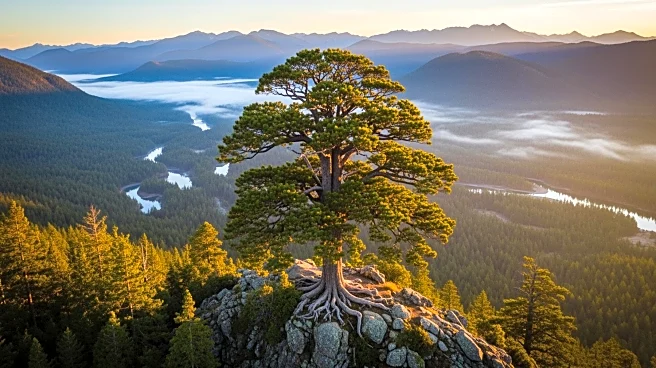What's Happening?
The COP30 climate summit in Belém marked a significant milestone for Indigenous peoples, who achieved unprecedented visibility and recognition. The Brazilian government officially acknowledged the Kaxuyana
tribe's original territory, a vast rainforest area, during the summit. Indigenous groups staged multiple protests and engaged attendees with cultural displays, advocating for their rights and environmental stewardship. Despite some exclusion from formal negotiations, Indigenous leaders secured a $1.8 billion financing pledge for land rights and conservation projects. The summit's documents highlighted the importance of Indigenous-managed territories in biodiversity conservation and climate mitigation.
Why It's Important?
The recognition of Indigenous land rights at COP30 underscores the critical role these communities play in environmental conservation and climate change mitigation. Indigenous territories are proven effective in preserving biodiversity and maintaining carbon sinks, which are essential for global climate goals. The financial pledge supports projects that secure land rights and strengthen local institutions, potentially leading to more sustainable forest management practices. This development may influence future climate policies, encouraging governments to integrate Indigenous knowledge and rights into broader environmental strategies.
What's Next?
Following COP30, Indigenous groups may continue to push for greater inclusion in climate negotiations and policy-making processes. The financial pledge could lead to increased collaboration between Indigenous communities and international organizations, focusing on sustainable development and conservation efforts. Governments might face pressure to further recognize Indigenous land rights and incorporate traditional knowledge into national climate strategies. The success at COP30 could inspire similar movements in other regions, advocating for Indigenous rights and environmental stewardship.
Beyond the Headlines
The acknowledgment of Indigenous land rights at COP30 highlights broader ethical and legal implications. It raises questions about the definition of 'local communities' and potential legal loopholes affecting land rights. The summit's outcomes may prompt discussions on the legal frameworks governing Indigenous territories and their protection. Additionally, the cultural visibility achieved at COP30 could foster greater understanding and respect for Indigenous traditions and their role in global environmental efforts.











